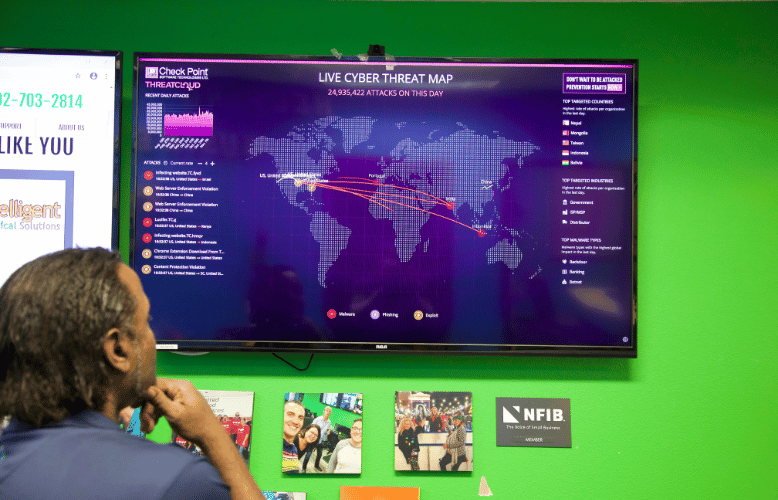Why Use Threat Hunting? (5 Benefits for Businesses)
July 19th, 2023 | 3 min. read

Every day, countless cyber criminals relentlessly probe networks, systems, and devices, searching for vulnerabilities to exploit.
Given the never-ending nature of cyber threats, you might wonder why we actively hunt for them. They’re everywhere: shouldn’t your tech department deal with them as they appear?
But as a managed security services provider (MSSP) with over 20 years of experience, we know that hunting for threats can make the difference between a regular day at the office and a meltdown of your entire IT system. Here at Intelligent Technical Solutions (ITS), we believe in proactive cybersecurity and taking an active role in keeping IT networks safe.
So in this blog post, we invited Sean Harris, ITS’ Senior Cybersecurity Vice President, to explain the following reasons your IT team should be actively hunting for cyber threats:
- Identifying unknown threats
- Rapid cyber threat evolution
- Preventing zero-day vulnerabilities
- Defense against advanced persistent threats (APTs)
- Strengthening cybersecurity posture
By the end of this article, you’ll have a clearer understanding of threat hunting’s significance and why you should implement it in your business.
1. Identifying Unknown Threats
While some cyber threats may seem obvious, many remain hidden beneath the surface, waiting to strike. The data breach life cycle takes an average of 277 days, and threat hunting helps push the number down and prevent hackers from getting a strong foothold in your IT network.
“Threat hunting involves actively looking for indicators of compromise and identifying the techniques and tactics used by malicious actors,” Harris said. “Skilled threat hunters can even attribute the attacks to specific hacking groups based on their distinctive marks.”
Identifying unknown threats empowers your team to understand attackers’ methodologies and develop effective countermeasures to protect sensitive data.

2. Rapid Cyber Threat Evolution
The second reason cybersecurity companies use threat hunting is the rapid evolution of cyber attacks.
It’s a constant race between cybersecurity experts and hackers: who has the best attack and defense techniques? Who can exploit and protect data better? Which side has a better understanding of cybersecurity strategies?
Part of this tech evolution is the proliferation of AI technology and AI-assisted cybersecurity programs. “AI applications in threat hunting will continue to evolve,” Harris pointed out, “and companies will need to rely on them and an iterative approach to stay updated on new threats.”
By actively hunting for cyber threats, organizations can stay one step ahead, anticipating and mitigating potential attacks before they cause significant damage.
3. Preventing Zero-Day Vulnerabilities
The third benefit of threat hunting is the prevention of zero-day vulnerabilities.
Zero-day vulnerabilities refer to software vulnerabilities unknown to the software vendor or the cybersecurity community. These vulnerabilities pose significant risks, as cybercriminals can exploit them before a patch or fix is available.
With threat hunting, security experts can discover zero-day vulnerabilities, allowing for timely protections and the development of patches or updates to mitigate the risk.
For example, Huntress - a threat hunting program - discovered zero-day vulnerabilities in Microsoft Exchange. Due to their expertise, companies using their service could patch this vulnerability and prevent a company-wide breach.
Overall, threat hunting lessens the window of opportunity for cybercriminals to exploit these vulnerabilities and reinforces the security of systems and networks.
4. Defense Against Advanced Persistent Threats (APTs)
Advanced Persistent Threats (APTs) are sophisticated and prolonged cyberattacks, often carried out by highly skilled hackers.
APTs typically involve targeted and coordinated efforts to breach an organization’s defenses, gather sensitive information, and maintain a long-term presence within the network. These require a high level of cybersecurity to stop.
It’s in these situations that having a threat hunting program pays for itself. Implementing threat hunting and having a solid cybersecurity plan versus having barebone security policies is like having a fully trained police officer versus a security guard.
“Security guards are better than nothing, but they’re not quite the same as having an actual military person - it’s different. There are different levels of training and response,” Harris said.
With threat hunting, you can proactively find APTs and identify signs of compromise early on, enabling swift response and containment of the attack.

5. Strengthening Cybersecurity Posture
Lastly, threat hunting improves your overall cybersecurity. Hunting for cyber threats goes beyond merely detecting and responding to attacks. It is a proactive approach to strengthening an organization’s cybersecurity posture.
Threat hunting is also an essential part of a healthy cybersecurity framework. The NIST cybersecurity framework, for example, includes threat hunting as a critical component of the security process.
Your company may have a lot riding on your cybersecurity as well - especially if you’re in a regulated field.
“Without strong cybersecurity, you might fail to get contracts with certain companies if you don’t have a certain security level,” Harris said.

Want to Learn More about Threat Hunting?
While cyber threats may indeed come to us naturally, waiting for them to strike is a risky and reactive approach. With threat hunting, you can gain valuable insights into potential vulnerabilities, unknown threats, zero-day vulnerabilities, and advanced persistent threats.
This proactive approach allows for effective preventive measures, timely responses to incidents, and the continuous improvement of cybersecurity defenses.
As an MSSP handling the cybersecurity of hundreds of companies, we’ve used threat hunting to ensure every piece of data stays safe. We’ve also prepared more guides you can use on your cybersecurity journey:
- How Companies Can Ensure They Have the Right Security In Place for Their Industry
- What Businesses Need to Know About Managed Cybersecurity Services
- How Much Does Cybersecurity Cost? (and Factors that Affect the Budget)
But do you want to see precisely where threat hunting can help your business? Get a FREE cybersecurity scan and find the gaps threat hunting can fill.
Kharmela Mindanao is a senior content writer for Intelligent Technical Solutions. She’s called Ella by her friends and likes yoga, literature, and mountain climbing. Her favorite book is Anxious People by Fredrik Backman. She creates art and poetry and is on a quest to find the best cheesecake.
Topics:
